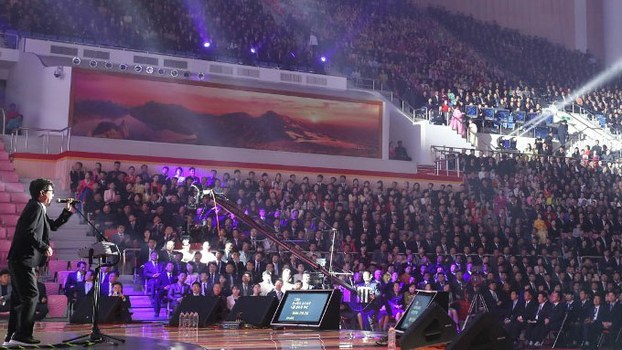




North Koreans working as contract laborers in Russia are being warned by authorities in Pyongyang against exposure to South Korean culture, as the two Koreas prepare for summit talks between the countries’ national leaders later this month, sources say.
The warning condemns South Korean culture as “anti-socialist” and was delivered at the end of last month to workers on construction and logging sites across the Russian Far East, an ethnic Korean living in Vladivostok told RFA’s Korean Service.
“This is the first time we’ve seen that North Korea has issued such a declaration to its workers abroad,” RFA’s source said, speaking on condition of anonymity.
“It’s probably because North Koreans working abroad all have mobile phones, and they often hear South Korean news when they talk with outside contacts regarding their work,” the source said.
Presented to North Korean workers in Vladivostok during a lecture on March 24, the warning was delivered simultaneously to other North Koreans working in Russia, including in the areas of Nakhodka, Ussuriysk, Khabarovsk, and Artem, the source said.
Use of the term “anti-socialist” was new, and distinguished the warning from less harsh declarations issued earlier, RFA’s source said.
“This term describes activities that actively oppose socialism, as opposed to the term ‘non-socialist,’ which merely indicates deviations from socialist principles,” he said. “This appears to be a very strict warning.”
The Russian order was the second clear example this month of North Korea trying to limit its people's exposure to South Korean culture.
Concerts given by South Korean performers in the North Korean capital, one on April 1 by South Korean singers and another on April 3 by South Koreans and North Koreans performing together, were opened only to top government officials and the country’s privileged class in a move aimed at blocking wider exposure to “capitalist culture,” sources in the isolated country say.
The concerts, were given in the lead-up to planned summit talks on April 27 between North Korean leader Kim Jong Un and South Korean President Moon Jae-In.
The shows were attended only by carefully selected audiences, though, with members of the general public kept away, a source in North Korea’s South Pyongan province told RFA.
Secret deals allow contacts
The Vladivostok source said authorities may be frustrated in their efforts to block workers’ contacts with outside influences, though.
“North Korean officials assign their workers to designated companies and restrict their workers in Russia from having outside contacts,” he said.
“However, the managers who are supposed to control them make secret deals with those companies and send the workers to other work sites too, where they can freely make contacts with the outside world,” he said.
Speaking separately, a Russian source in Ussuriysk confirmed that North Korean workers there had been warned against South Korean cultural influences.
“The declaration said that any activities opposing socialism--including watching or distributing South Korean television dramas, movies, music, or videos--would be strictly punished,” the source said, also speaking on condition he not be named.
North Korean workers to whom the declaration was issued are now mocking the warning, though, noting that Pyongyang has recently invited a troupe of South Koreans to perform songs and dances in the capital, the source said.
“We expect that thorough inspections will now be made of the workers’ mobile phones,” he said.
North Korea has regularly exported workers to Russia, China, the Middle East, and Africa, requiring them to remit most of their earnings to Pyongyang, which is believed to use the cash to fund its nuclear weapons and missile programs.
In September 2017, however, the U.N. Security Council adopted resolutions prohibiting companies from accepting North Korean workers in response to a nuclear test the North conducted earlier that month.
Three months later, the Council unanimously passed an additional resolution requiring all North Korean workers in other countries to return home within two year.
The resolution was drafted by China and the United States in response to a ballistic missile launch that Pyongyang said was capable of reaching the U.S. mainland.
Reported by Jieun Kim for RFA’s Korean Service. Translated by Leejin Jun. Written in English by Richard Finney.